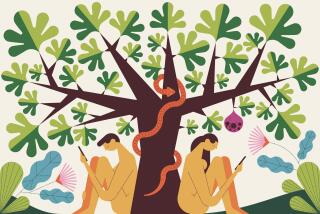An Encounter of the No-Strings-Attached, 5,000-Volt Kind
Sexual permissiveness has been a hallmark of college campuses for decades. But yesterdayâs one-night stand has evolved into todayâs âhooking up,â a slang term that describes casual sex in the extreme. Although hooking up is used to describe brief, spontaneous sexual encounters between two people, the term is somewhat ambiguous.
As one local college student explains, context matters. âIf I say, âI am going to hook up with my friends at a club later, it means we are going to meet up,â said Melanie Crew, a 22-year-old Santa Monica College student. âBut if I say, âOh, I hooked up with this guy last night,â it means something physical happened.â
Defined in the sexual sense, hooking up is an unplanned sexual encounter between strangers or acquaintances ranging from a kiss to intercourse. It doesnât usually include spending the night together and rarely extends beyond a single encounter.
The behavior that occurs during a hookup and a one-night stand may seem to be the same, said Elizabeth J. Paul, an associate professor of psychology at the College of New Jersey, who has conducted two studies on the phenomenon. But hookups, unlike one-night stands of the past, have become a primary way that college undergraduates connect sexually, a no-strings-attached physical charge that has become the norm at secular colleges across the nation, she said.
âHooking up is a way for students to feel connected in a culture that is increasingly distrusting of emotional relationships,â said Paul, whose students, abuzz with talk of hooking up, inspired her to explore the phenomenon five years ago. âWhat my students say to me is, âI donât want all the baggage of an emotional relationship, I want the charge without the argument over which way I put the roll of toilet paper on.ââ
Hooking up appears to be occurring on campus more than casual sex used to, Paul said. Not surprisingly, intoxication from alcohol or drugs advances the likelihood that a hookup will culminate in sexual intercourse. Perhaps most alarming, she said, hookup partners usually donât talk about sexual histories or take precautions against STDs or pregnancy. There is often no discussion about what is happening, and there is little interaction afterward.
âA lot of people will hook up at parties, especially when alcohol is involved, and it doesnât usually go beyond petting,â said Allegra Hill, a 19-year-old San Jose State University student, who noted that âdatingâ in the old-fashioned sense is nonexistent there. âHooking up is so accepted, it is not considered a big deal. One of my friends hooked up with this guy, and I had taken a picture of him. She was so happy because she couldnât remember him or his name. She was hoping she would remember him when she saw his photograph.â
Last year, the Journal of Sex Research published a study on hooking up conducted by Paul and her colleagues. They wrote that 75% of 550 (mostly heterosexual) undergraduates reported having experienced a hookup. One-third reported theyâd had intercourse with a stranger or acquaintance. In another unpublished study of 187 students that explored studentsâ views of best and worst hookups, Paul found that 70% reported hooking up at least once, with the most âexperienced participantsâ reporting an average of 10 hookups in their college career.
A more conservative number emerged from a recently published survey of 1,000 college women conducted by the Institute for American Values, a New York-based nonprofit think tank that promotes the importance of family and fatherhood. The survey, commissioned by the conservative Independent Womenâs Forum, a critic of contemporary feminism, found that 40% of women undergraduates said they had hooked up with a man at least once, and 1 in 10 said they had done so at least six times.
Contributing to the campus hookup culture, said demographer Norval Glenn, a professor of sociology at the University of Texas at Austin and co-author of the Institute for American Values study, is the unequal ratio of women to men. There are, on average, 100 women for every 79 men on American campuses, said Glenn. âMen have the upper hand,â he said flatly.
âMen are pretty passive. They donât have to do very much to get what they want. One comment in our study from a female student at Colby College in Maine was that men wouldnât even go from one end of the dorm to the other to establish a relationship because they didnât need to.â
Miquel Moore, a 22-year-old Southern Illinois University undergraduate agreed. âAll a guy has to do is say, âHey, I like you. Here is my dorm room number,ââ said Moore. âThere is a lot of casual sex. If I have a girl I hook up with, we agree to have sex and there is no connection or title [such as girlfriend or boyfriend]. It gets dangerous when emotions come into play.â
Paul and Glenn, the researchers, are alarmed on a number of fronts. The first is that partners who hook up are less likely to use protection against STDs or pregnancy (in one study of hooking up, said Paul, only 13% of participants reported using protection).
Second, hooking up is a lousy replacement for cultural courtship rituals and is not likely to foster the emotional and social maturity required to forge solid relationships later. Third, hookups are void of emotional connection.
âI donât think casual sex is always casual sex,â said Paul. âThe people throughout my latest report say that these are very intense emotional experiences, even if they last only an hour or a couple of hours. We focus on the physical ramifications of sex, but we also need to focus on the emotional ones.â
*
Next week: The emotional fallout of hooking up.
More to Read
Sign up for Essential California
The most important California stories and recommendations in your inbox every morning.
You may occasionally receive promotional content from the Los Angeles Times.










